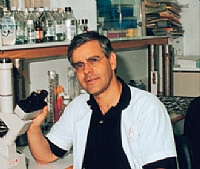Israeli scientists identify genes that affect multiple sclerosis (MS) patients' responses to copaxone
Prof. Ariel Miller of the Ruth and Bruce Rappaport Faculty of Medicine and Head of the Multiple Sclerosis and Brain Research Center of the Carmel Medical Center in Haifa, together with researchers at the Weizmann Institute, located in Rehovot, Israel and Teva Pharmaceuticals announced recently that they have identified genes that affect how MS patients will respond to the MS drug Copaxone.
Copaxone, in 1996 became the first original Israeli drug to be approved by the U.S. Food and Drug Administration (FDA). It is now marketed in over 40 countries worldwide. The sales of the drug have made a significant contribution to the Israeli economy. Copaxone is produced and marketed by Teva Pharmaceuticals.
Prof. Miller is very hopeful that the discovery of these genes will lead to improvement in the treatment for MS sufferers. Until now determination of the correct medication and dosage has largely been achieved through the method of "trial and error". According to Prof. Miller, the trial and error method can affects the efficacy of the treatment and can lead to complications in some cases. Finding the correct medication and dosage according to the genetic makeup of each patient is likely to be more successful and to cause fewer side effects.
As part of the research, DNA sequences in 27 candidate genes from each patient were studied, resulting in the identification of two genes with a high potential for determining the response to Copaxone. Prof. Miller and the other researchers are hopeful that in the future, it may be possible to scan the genome of MS sufferers to predict the response levels in advance to Copaxone, and thus be able to optimize the dosage and treatment protocol for each patient.
The research was recently published in the Journal of Pharmacogenetics and Genomics.
Related Links









 Weizmann Institute Press Release
Weizmann Institute Press Release